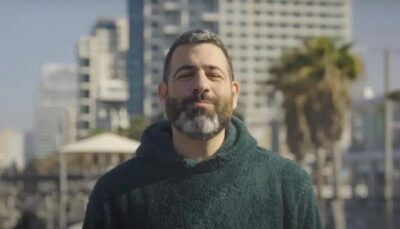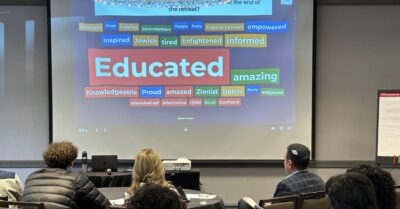This past weekend I attended the Israeli-American Council (IAC) conference in South Florida. According to the organization, they work to strengthen the Israeli-American community, the American Jewish community and the bond between Americans and Israelis.
Approximately 3,000 people attended the conference, and speakers included Israeli Defense Minister Benny Gantz, Israeli Diaspora Affairs Minister Nachman Shai, Israeli Minister of Aliyah and Integration Pnina Tamano-Shata, U.S. Representative Ritchie Torres (D-NY), Israeli author Micah Goodman and Israeli Olympic champion Linoy Ashram.
There was so much to take in from all of the discussions and events. I decided to put my editor hat on, and here are 8 key takeaways from the conference.
1. Why is there only a BDS movement against Israel?
Democratic Congressman Ritchie Torres (NY-15) discussed his efforts to fight antisemitism and gave a strong rebuke of the BDS movement. Speaking at the closing session, Torres underscored that “the rhetoric that we use has real world consequences.”
“We should use words that promote peace rather than incite hatred,” he said. “When you use inflammatory language like ‘apartheid’ or ‘ethnic cleansing’ or ‘genocide,’ you’re not promoting peace, you’re inciting hatred, and you’re not part of the solution, you’re part of the problem.”
Torres rejected the BDS movement as one of many examples of the blurred line between anti-Zionism and antisemitism.
“For me, one need not be Jewish or Israeli to see clearly the antisemitic double standard against Israel,” he said. “The notion that Israel’s existence should be the subject of debate is outrageous and offensive. The BDS movement should be relegated to the fringes of American politics.”
“I often ask, why is there only a BDS movement against Israel?” Torres added. “Why is there no BDS movement against China for committing genocide against Uyghur Muslims? Or against Myanmar for ethnically cleansing Rohingya Muslims? Or against Iran for being the leading sponsor of terrorism in the world? Or against Turkey for occupying northern Cyprus?”
“If the selective outrage and delegitimation against Israel is not explained by antisemitism, then what exactly explains it?”
Torres concluded that everyone has a responsibility to speak out against hate in all forms.
“I reject the notion that you have to be Jewish to fight antisemitism any more than you have to be black to fight racism. I think we all have an obligation to ensure extremism is fought no matter what form it takes [and] no matter what direction from which it comes.”
2. To fight antisemitism, we need to distinguish between the “wicked son” and the “simple son.”
At a conversation on the rise of antisemitism in the U.S. and what we can do to fight it, Jonathan Sarna, professor of American Jewish history at Brandeis University, used the metaphor of the Four Sons from the Passover Haggadah to help us better understand the sources of antisemitism.
Sarna encouraged us to distinguish between the “Rasha” (the wicked son) who seeks the destruction of the Jewish people, and the “Tam” (the simple son) who is simply ignorant. “When is it someone who seeks the extermination of Jews, and when is it someone who just needs to be educated?” he asked.
When it comes to the “Tam” category, we can and should fight it with education, Sarna argued. “But there are also people who truly have the desire to wipe out Jews. It is important not to confuse the two.”
3. Who should lead the fight against antisemitism?
One topic that came up in the discussions about antisemitism was the question of responsibility. Who in the Jewish world should be leading the fight against it? Should the Israeli government be leading this effort, especially for antisemitism under the guise of anti-Zionism, or should Jewish organizations or individuals in the Diaspora be doing this?
In conversation with Israeli Minister of Diaspora Affairs Nachman Shai, IAC board member Shawn Evenhaim noted that influencers like Bella Hadid — who shared photos and videos of herself at a pro-Palestinian protest this past May — have 50 million followers on Instagram or more. Evenhaim argued that American Jewish organizations “don’t have resources to fight that” and suggested the Israeli government should take responsibility for the problem.
Minister Shai replied that the Israeli government is “screening and monitoring social media and collecting data about antisemitism,” and that it is making this a priority. But he also said that the government has only begun this effort recently, and that there is no central agency to tackle the problem, adding, “We need one central agency where we can coordinate” on antisemitism.
4. How is antisemitism affecting young Jewish people?
When it comes to how antisemitism is affecting young Jewish people, there is both “good news” and “bad news.” On the one hand, StandWithUs CEO Roz Rothstein said that “students are becoming engaged because of antisemitism… They feel motivated to become more knowledgeable and better leaders.”
Sarna, American Jewish history professor at Brandeis, agreed with this point, noting that “King Ahasuerus giving his ring to Haman” (and granting him authority to carry out his plans to destroy the Jews) “did more to bring Jews to Judaism than all of the prophets combined.”
However, Todd Sukol, executive director of the Mayberg Foundation, had a different perspective, arguing that antisemitism is “eroding Jewish self-confidence” in young people who frequently hear claims like “Israel is an apartheid state.” He said that this environment is leading many young Jews to question, “Are we really on the right side here?” and even to feel ashamed of or disown their Jewish identity.
5. How can we work with other oppressed groups to fight antisemitism?
Professor Sarna argued that the American Jewish community should forge more ties with Asian Americans, noting, “They are natural allies” in the fight against antisemitism and bigotry. StandWithUs CEO Rothstein agreed, noting that the concept of intersectionality — the idea that groups who are oppressed “have the opportunity to reach out to friends and allies” — is a positive here.
However, Hillel Newman, Consul General of Israel to the Pacific Southwest, responded, “We do extend our hand in friendship…but sometimes we get a cold response. We have to identify who our allies are.” Rothstein agreed, noting that some in the Black Lives Matter movement “were very antisemitic. But some really were friends.”
6. The Israeli-Palestinian conflict has more than one battlefront.
A recurring theme in the discussions was the idea that there is more than one battlefront in the Israeli-Palestinian conflict and the fight against antisemitism. In addition to a military conflict, there is also a battle for “hearts and minds” being fought in the media and social media, participants argued.
Israel has a “front in the north, a front in the south and a front in the world,” IAC board member Evenhaim said.
Similarly, Consul General Newman said, “We have two fronts” in the fight against antisemitism: There is a “physical front” in the form of attacks against Jews and Jewish institutions in the streets. The second front is “an attack on the legitimacy of the state of Israel and of Judaism.”
Moran Yarchi, a professor at the Sammy Ofer School of Communications at Reichman University in Herzliya, Israel, elaborated on “how the image war is a salient part of today’s conflict.”
Yarchi underscored that there are both “media and military arenas” to this conflict, and Israel must invest in both its military and its image. “We can be successful on the battlefield but get crushed in the media space,” she said.
“Losing” the battle over social media narratives has real-world implications, translating into less political support for Israel and more government policies against Israel, she added.
To wage an effective media campaign, Yarchi continued, Israel should tell its story through a “narrative of compassion.”
“The best angle that works is the personal angle,” she said. “If instead of sharing footage of men in uniform, we show how teenage girls have to run into bomb shelters, people will relate to that story. When there is a conflict,” people need to understand that “Israelis are suffering too.”
7. Education and media are critical to shaping the conversation on Israel.
If military equipment and weapons are tools we need to fight the physical war, then media and education are how we can address misinformation and improve Israel’s image in the world, speakers and participants suggested.
The Jewish state needs to “change its strategy” to focus more on its international image, Reichman communications professor Yarchi said. For example, this past May, Israel’s bombing of a building in Gaza that housed the Associated Press and Al Jazeera news agencies caused a public relations disaster. Yarchi said that this could have been avoided if Israel had explained why it was striking the building beforehand.
(Maj. Gen. Nitzan Alon, the former head of IDF Operations, expressed a similar view, telling The Times of Israel a few weeks ago, “Bringing down the tower with the AP offices was equivalent to a self-inflicted ‘public relations terror attack’… I am convinced that this was a mistake. The operational benefit was not worth the damage that it caused diplomatically and in terms of perception.”)
Although Israel has a critical role to play in influencing its own image, each one of us must respond to the most intense accusations against Israel, Consul General Newman argued, noting that “One tweet can be worth more than a thousand newspaper articles.”
Meanwhile, many speakers and participants underscored that education is critical to the ability to respond to some of the harsh rhetoric against Israel.
“People want to support Israel” and respond to claims like “Israel is an apartheid state…but they don’t have the knowledge,” one participant said. “We’ve got to educate Diaspora Jewry, or else we are not going to be able to address this problem.”
Meanwhile, Yarchi underscored that it is impossible to be “victorious” in the “war” on social media, “but you need to have successes.”
8. How does Judaism define happiness?
Meanwhile, Israeli author Micah Goodman focused on a completely different topic: what Judaism says about how to be happy (stay tuned for our new educational resources and podcast coming soon on this topic).
Goodman interpreted a Jewish definition of happiness this way: “Judaism is not about self-actualizing, doing it your way or becoming yourself. It’s about surrendering yourself.” It’s “not about fulfilling yourself, but connecting yourself to something bigger than yourself.”
Happiness comes from connecting “the ethos of actualization” or “actualizing,” and “the ethos of belonging to something bigger than yourself,” he said.
Goodman paraphrased Martin Seligman, professor at the University of Pennsylvania and founder of the positive psychology movement, to further express this idea. “He has this great line, a great recipe for happiness,” Goodman said. “Happiness comes when you tap into the greatest qualities of yourself in service of something greater than yourself.”





